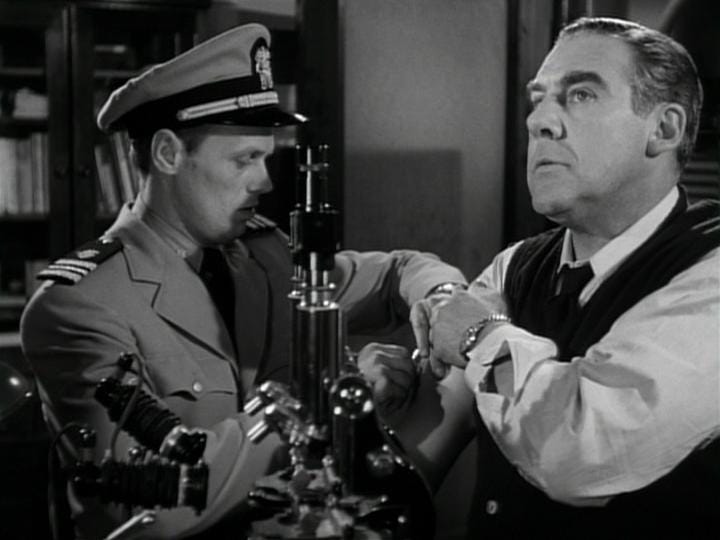My one-sentence elevator pitch for the 1950 film Panic in the Streets” goes something like this: Anthony Fauci … the movie. (“Ah,” some of you out there are thinking, “so this is a sexy film.”) It’s a half-joking but still mainly serious description; the movie has nothing to do with Fauci himself and none of the characters particularly resemble him, but it accomplishes something Fauci himself has been doing quite well these past few months—it takes what may seem like the boring, unromantic aspects of epidemiology and makes you interested in them.
Other pandemic films hit you with the anxiety and horror of a pandemic in full swing; Panic in the Streets takes you on a journey of a health professional trying to head off an epidemic before it begins. This is, I kid you not, a film noir about contact tracing. Contact tracing! It’s a movie that, if I didn’t know otherwise, I would think just had to have been written by an epidemiologist because, and I know I repeat myself, IT’S A FILM NOIR ABOUT CONTACT TRACING. I’m picturing an epidemiologist at some fancy-schmancy 1940s Hollywood party pitching to some producer: “I mean hardboiled detectives are cool, but get a load of what I do.” The thing is, the imaginary epidemiologist I’ve conjured up for this joke is right; epidemiology is kind of interesting and very important, and, more significantly for this article, it works shockingly well as the subject of a film noir.
I’m writing about Panic in the Streets not just because of our current pandemic but also because the film celebrated the 70th anniversary of its release on Friday. Despite being made at a time when America lost its mind and decided anything could be put in Jello, the world in the film would be remarkably familiar to modern viewers. Our clothes are different and our social attitudes have progressed, but Panic in the Streets succeeds in the area that any film hoping to avoid the dustbin of datedness must: It captures unchanging themes of human nature.
The movie follows Lieutenant Commander Clint Reed, a commissioned corps officer of the U.S. Public Health Service, who is called into the morgue in New Orleans where he’s stationed, to examine an unidentified murder victim whose body, in addition to having a few bullet holes, shows signs of a rare illness. Reed, played by Richard Widmark, identifies the illness as pneumonic plague and has to work with the police captain to solve the dead man’s murder to figure out who was exposed to the plague. While the film contains some scientific inaccuracies—a sailor who smuggled the sick man into the country is offered “anti-plague serum,” which, well, doesn’t exist—the tools and processes Reed uses are largely real and still used today—things like contact tracing, social distancing, and quarantines. Of greater interest, however, is how the public responds to Reed in his quest to save them from the potential-epidemic.
Back on April 1, the Morning Dispatch featured a segment on the parallels between the public response to the 1918 flu pandemic and coronavirus. The array of reactions to coronavirus are fascinatingly similar to how the public responded to the Spanish flu 100 years ago—much of the public listened to what they were told by the experts of the day, but many complained about the economic toll of large-scale quarantining, bought quack remedies, and refused to wear masks. Times may change but how people react to their circumstances does not. And that same social response to the pandemics of 1918 and 2020 is present too in Panic in the Streets. There’s a restaurateur who doesn’t want to shut down due to the financial loss he would incur, despite the fact that the sick man visited his restaurant; government officials who hide information from the press to avoid causing alarm; even the police captain Reed is forced to work with, Tom Warren, is initially skeptical the plague is as big a threat as Reed is making it out to be—Warren’s wife died due to a misdiagnosed illness, leaving him distrustful of the expert class. With his disparaging of the “experts from Washington” and suggestions that Reed is only making a big deal out of the plague to inflate his own importance, one could assemble a COVID-conspiracy think piece from Warren’s lines and be almost guaranteed of its publication in certain spheres of the internet.
Panic in the Streets is a testament to some of the worst excesses of human nature, of an eternal human propensity to distrust experts and place the interests of the self over those of the community. We often bandy about the phrase “Those who cannot learn from history are doomed to repeat it” but it isn’t entirely true. Sure, we can learn from the mistakes and successes of our ancestors, but there are some errors we as a species will simply make over and over again. Human nature, left unchecked, dooms us to them.
Still from Panic in the Streets courtesy IMDB.









Please note that we at The Dispatch hold ourselves, our work, and our commenters to a higher standard than other places on the internet. We welcome comments that foster genuine debate or discussion—including comments critical of us or our work—but responses that include ad hominem attacks on fellow Dispatch members or are intended to stoke fear and anger may be moderated.